- Home
- Nevil Shute
Marazan Page 6
Marazan Read online
Page 6
I stepped back a pace. ‘You can leave that alone,’ I said. ‘It’s no business of yours.’ I didn’t want him to see the convict clothes in the bag.
‘Ho,’ said he, ‘so that’s it. D’you reckon I don’t know what you’ve got in that bag? Hey? D’you think I don’t know the game. I’ll tell you what you’ve got there. One o’ my Plymouth cockerels. That’s what you got there. One o’ my Plymouth cockerels. The one as had his leg trapped, so’s you got him easy. That’s what you got there. Hey?’
It was absurd. To show that I was not responsible for the missing cockerel I had only to open my bag, and that was precisely what I could not do. It became evident to me that I was in a corner; that I could only get out of this absurd situation by laying a red herring. I must see that it was a good one.
I moved over to pick up my cap; as I did so it occurred to me to walk with a pronounced limp.
‘Hey …’ he cried, and stopped short. I thought I could detect a note of uncertainty in that ‘Hey’, and smiled to myself. I crammed the cap on my head and turned to him again. He looked undecided and furtive; the colour was not so high in his beastly face as it had been. For a moment I felt quite sorry for him. Then I dropped my bag.
‘What do you mean by that?’ I said.
The stuffing seemed to have fallen out of him all of a sudden. ‘I didn’t mean nothing,’ he said.
I moved a little closer to him. ‘Oh yes, you did,’ I said. ‘Now suppose you think a bit, and tell me just what you did mean.’ I eyed him carefully. He was a bigger man than I, but I could see that he wasn’t going to give me much trouble.
He didn’t answer, so I asked him again.
‘I seen about you in the paper,’ he muttered. ‘I didn’t mean you no harm.’
‘That’s as it may be,’ I said very softly. ‘But you weren’t very hospitable, were you?’
Then I hit him. Looking back upon it now, I think that was the dirtiest thing I did in the whole business, if not in my life. He hadn’t a notion what was coming to him. He was peering forward at me as they always do when you suddenly drop your voice. It’s a trick I learned when I was a boy; I suppose that shows the sort of school I went to better than any words of my own. He was leaning forward; I caught him fairly on the point of the chin with the whole weight of my body behind it. His teeth came together with such a crack that for the moment I thought I must have broken his jaw, then he crumpled up at the knees and fell backwards in a heap at my feet.
As I say, I think it was about the dirtiest blow I ever struck. At the same time, I dare say I should do it again. I was four miles from a railway station; with this village Sherlock on my trail I’d never have got away. I owed it to Compton to make a better show than that.
There were a lot of tag-ends of bindings lying about on the ground, little thin bits of rope about the thickness of a pencil, but quite strong. Before he came to I had got him well trussed up, with his hands behind his back and his feet tied. Then I took him and laid him in the ditch by the haystack and covered him up with hay all except his face. I sat down beside him and waited for him to wake up, occupying my time and inventive capacity in devising a gag from his handkerchief and a bit of stick.
He came to himself presently, and when he was moderately clear I talked to him like a father.
‘Now look here,’ I said. ‘You’ve got to stay here for the next five or six hours I’m afraid—and just to make sure that you do, I’m going to gag you. I don’t suppose you’ll be able to untie those knots. I see you know who I am; I’m Compton, the convict from Dartmoor. Nobody knows I’m in this part; if you hadn’t come interfering with me I’d have let you alone. As it is, I’ve got to protect myself. Now, I’m going to gag you and leave you in this ditch covered over with hay; then I’m going up to London by train. When I get there I’ll send a telegram to your home to tell them where you are.’
He began to swear in a perfectly dreadful manner, so I gagged him and nearly got my finger bitten off in the process.
‘If you do that again,’ I said angrily, ‘I’ll give you such a clip on the ear as’ll send you to sleep again.’ I got out my note-case and a bit of pencil and waited till he had done struggling. ‘Now, what’s your address? You’d better tell me quickly: it’s your best chance of getting loose this evening.’
I untied the gag and he told me his name, Fred Grigger, and the name of his farm. I noted that down and gagged him again well and truly. Then I turned him over on his face and put another lashing on his hands for luck. Finally, I turned him right way up again, made him as comfortable as I could with a bundle of hay under his head, covered him over with hay, and left him to his own devices.
It was about half-past one. I studied my map for a little and decided to make for Culham station, which I judged to be about four miles away. I picked up my rucksack, slung it over my shoulders, and set off down the road munching a sandwich as I went.
It took me some time to find the station and I had to ask more people than I liked. However, I was lucky in my train, which came along about ten minutes after I arrived. I booked a ticket to Reading, meaning to change there and get along down west after I had telegraphed about Grigger.
At Didcot an engine-driver got into my compartment with his mate. It struck me that I might get a little information out of them, and sounded them about trains for the west. It appeared that the next Exeter train was the 5.10 from Paddington, getting to Exeter at about half-past eight. It stopped at Reading. I considered this information carefully. The train that I was in was due at Paddington at 3.34; it seemed to me that it would be wiser to go on up to Town and send my telegram from there rather than to risk identification by hanging about on Reading station for three hours.
We got to Paddington at about twenty minutes to four. I dived straight down into the Tube and took a ticket for Waterloo. At Waterloo I came up into the daylight again and plunged at random into a labyrinth of mean houses and squalid streets. After walking for five minutes I found a post office and sent the following telegram:
‘Grigger will be found in a ditch by a haystack near the Dorchester Abingdon road tied up and covered over with hay.’
I put a false name and address on this and passed it across the counter; the girl looked at me curiously as she gave me the change, but didn’t make any comment. I impressed myself on her memory by asking the way to St. Pancras Station, and being so dense that she had to explain it all to me twice. Then I got away, found my way back to Waterloo and so to Paddington again. I had a quarter of an hour to spare, so I went out and bought a cheap suitcase, into which I put the rucksack without unfastening it. It made me a little too conspicuous for my liking.
I got down to Exeter without any further incident, though I must say I was glad the train didn’t stop at Didcot. It seemed to me that I shouldn’t run much risk in going to a hotel for the night so long as it was one in keeping with my clothes and general appearance. I wasn’t exactly tired, but I had the feeling that the chance of a good night in bed wasn’t one that I could afford to despise.
I had stayed in the town once or twice when I had been flying in the neighbourhood, but I didn’t want to go to the sort of hotel that I had stayed at then. For one thing, they might remember me, and that would tend to spoil any dramatic effects that I might want to produce when I left the town. I took my bag and walked from the station up to the High Street, and then down the hill towards the river. I crossed the bridge and a little farther on I saw exactly the sort of place I was looking for, a ‘family and commercial’ hotel of a definitely middle-class type. I went in there and booked a room, signing myself in the register as E. C. Gullivant.
I was afraid to stay in the hotel; it was becoming clear to me what a nerve-shaking thing it must be to be a genuine fugitive from justice. I didn’t quite consider myself as that yet, though I must say the Abingdon affair had turned me into something remarkably like it. I went out again into the street, and up the town, and presently I turned in to a picture-house.
/>
I like the pictures. It’s the only place where I can enjoy myself when I’m at all tired. I never was one for reading much, and most theatres nowadays seem to require that one should be a little drunk to appreciate them properly. But the pictures are different; I turned in to this show with my pipe, sat down in the darkness behind a pair of couples and began to think what I was going to do next. I thought it pretty certain that I had thrown off any pursuit from Abingdon; at the same time I had managed to lay a good fat red herring there in the approved desperate character style. My next move must be calculated to bring discredit on the fair name of Gullivant.
This was Thursday evening. By this time Joan Stevenson would be in Salcombe fixing up the vessel for me—it seemed incredible that it was only that morning that I had left her and Compton. She would be clear of Salcombe by to-morrow afternoon; I could go down there to-morrow evening if I wished and get to sea at once. I knew that I could trust her to have everything ready for me.
There were two girls in front of me sitting together and flanked by their attendant swains. Suddenly one of them turned to the other:
‘He’s bitten me!’ she said indignantly.
This sent me into a paroxysm of subdued laughter and put a stop to any further planning for the moment. I laughed so much that they heard me and broke away from the clinch; it was evident that I had spoiled their evening and presently they got up and went out, not without dignity. I was sorry then. It has always seemed to me that one should live and let live; after all, one never knows when one may want to bite a girl in the pictures oneself.
I stayed in there till the end of the show and then strolled back to my hotel. There was nobody about in the hall and I got up to my room without meeting a soul; a circumstance for which I was thankful. I was getting very nervous; I was half sorry that I hadn’t spent the night in the fields somewhere. It was a warm night; I could have done so quite well.
I undressed slowly, pondering my plans. I came to the conclusion that I must lay two more red herrings before I got away to sea—good smelly ones. One I would leave next day in Exeter or the neighbourhood; the other I would lay in Salcombe itself on the Saturday morning, so that there should be no difficulty in connecting me with the departure of the Irene. I cannot remember that at any time I worried very much as to what would happen when eventually I brought the Irene back to Salcombe and took up my ordinary life again. That didn’t worry me at all, oddly enough. I think that even then I must have realised that things were unlikely to go exactly to plan. For one thing, I thought that Compton would be caught by the police long before I landed to pick him up on the little beach at the entrance to the Helford River.
Still pondering deeply, I got into bed and snuggled down beneath the clothes. Then I swore, more in astonishment than in pain, because it was clear that somebody had been being damn funny with my bed. There was something in it, down at the foot. I lit my candle again and groped about at the bottom of the bed, and presently fished up a small china candlestick ornamented with a wreath of blue roses and the legend: ‘A Present from Plymouth.’ And then I saw that it had a little china ring for a handle, and through this ring there was stuffed a piece of notepaper, rolled up into a little cylinder. On the paper was the direction, scrawled carefully in pencil:
‘Mr. Compton.’
‘Good God!’ I said weakly, and sat staring at it for a moment. Then I pulled myself together, took the paper from the candlestick, and unrolled it. It was quite a short note.
‘The party you coshed at Abingdon got free at 4 and made hell you was a fool to tell him. Mattarney comes to England before the 15th and goes on with the boat. Write to RLT he can fix up for you to see him. You’re OK now but move on to-morrow.’
Short, snappy, and probably very much to the point. It wasn’t signed.
I must have lain in bed staring at the ceiling for fully half an hour, the paper in my hand and the candle guttering by my side. At last I roused myself, blew out the candle, and tried to summarise my conclusions before I went to sleep. The note I placed carefully in the pocket of my coat. I would have burned it there and then but for the reflection that if I did so I should think in the morning I had been under the influence of alcohol.
First of all, my unknown correspondent was in touch with a pretty efficient intelligence bureau of some sort. This bureau was evidently illicit or it would hardly be priming me with information of that sort. They knew all about Compton and were well disposed towards him. There was the information that Mattarney was to do something on the 15th, ‘and goes on with the boat’. Compton’s important day had been the 15th, and he had spoken about Mattani to the girl. I wondered who Mattani was and whether he was Irish or Italian. Lastly, it was evident that the bureau didn’t know everything, because they hadn’t tumbled to the fact that I had changed places with Compton.
I hoped most devoutly that the police would prove a shade slower at the uptake than this lot.
One thing was clear; that some organisation was keeping a benevolent eye on me in the belief that I was Compton. Whether they would continue to do so when they learned the truth was another matter. I began to feel that I was not the important person that I thought I was; that I was a mere pawn in some game that Compton was playing which I knew nothing about. This worried me. It seemed to me that the best thing I could do was simply to carry on as I had intended, to lay my red herrings to the best of my ability, and to get away to sea as soon as possible. At the moment the only thing I could do was to go to sleep.
I turned over on my side and began to drowse. There was one point in the note that struck me then, and the drowsier I grew the more important it seemed, till it seemed to me that it contained the whole essence of the affair. Mattarney … goes on with the boat. What boat was that? Surely not a liner; the phraseology seemed all wrong for that. A merchant vessel of his own? A yacht? And where was she going to?
Then, just before I went to sleep, my mind went off at a tangent. Private intelligence bureaux with a fatherly interest in criminals might be assumed to be criminal themselves. What grade of criminal was likely to need the services of such an organisation? Secret societies have never had a very great vogue in England unless for definite purposes of gain. What sort of illicit gain? Coining? That didn’t seem very likely. It would be something more easily concealed, some business in which the risk of detection was small, the profits large, and with a necessity for numerous agents. Possibly the boat was connected with it. Could it be some form of smuggling? That didn’t seem to fit in with modern conditions.
And then, quite suddenly, I remembered what Compton had said when I asked him what he was imprisoned for. He had told me.
‘Embezzlement,’ I had said. ‘Well, that’s a nice clean sort of crime. So long as it wasn’t anything to do with dope or children.’
He had looked at me curiously and had asked rather a curious question considering that he was pressed for time.
‘You don’t like dope?’ he had said. And I had cut him short. I wished now that I hadn’t.
I slept well in spite of everything. I woke at about seven o’clock, got out the note, and read it again. Then I lay for a long time trying to make a plan. The essentials weren’t difficult. I had registered in the hotel in the name of Gullivant. Gullivant had to be firmly identified with Compton, the convict, in such a way as to bring the police hot on the scent. I didn’t think I ought to do that too early in the day. Salcombe was not so very far away from Exeter; I didn’t want my Exeter reputation to follow me there before I was ready for it. I must have a bit of a start.
I dressed thoughtfully and went down to breakfast. It seemed that I was the only person in the hotel, which was very little more than a pub in point of fact. I ate my breakfast under the eye of the waiter, lit a pipe, and turned into the commercial room. Idly I picked up a paper, and there it was.
It shrieked at me in headlines on the front page:
OUTRAGE BY ESCAPED CONVICT ON
OXFORD FARM
&nbs
p; COMPTON IN LONDON?
Compton, the escaped convict from Dartmoor, was identified in Oxfordshire yesterday, where he was the author of a violent attack upon a young farmer, Frederick Grigger, in a field near Abingdon. The convict made good his escape, and at the time of going to press he is still at large. It is believed that he is making for London.
Our correspondent found Mr. Grigger at his farm, where he is recovering from his injuries. ‘I was walking along the hedge,’ said Mr. Grigger, ‘when he dashed out and came at me like a mad bull.’ Mr. Grigger was severely handled. ‘I am a strong man,’ said Mr. Grigger, ‘having been runner-up in the South Oxfordshire Ploughing Championship two years ago, but he shook me as a terrier shakes a rat.’ The motive of the outrage remains a mystery, though the disappearance of a cockerel from Mr. Grigger’s farm may supply a clue.
There was a lot more of it; Grigger had evidently made the most of his opportunity. To every man, I suppose, there comes the chance of fame of one kind or another, and one would be a fool not to make the most of it. At the same time, it looked like being very awkward for me if it ever came out who I was. He had fairly let himself go. As I read the account I began to get a little indignant; he hadn’t played fair. He said that I had struck him with a loaded stick. I hadn’t; I struck him with my own strong right arm—as he knew perfectly well. My knuckles were still sore.
A waiter passed through the room and saw what I was reading. ‘Shocking thing about this convict, sir,’ he said.
‘Perfectly appalling,’ I said gravely. ‘I can’t think what the police are about, letting this sort of thing go on.’ I was pleasantly conscious that I was providing him with the sensation of his life.
I finished my pipe and went out to the post office. My letter was there, an envelope with thirty pounds in notes in it. I looked for some letter with the notes; it seemed to me that it would have been an improvement if there had been a line or two of encouragement with the money. However, there wasn’t. It was safer so, anyway.

 On the Beach
On the Beach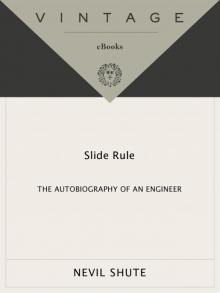 Slide Rule
Slide Rule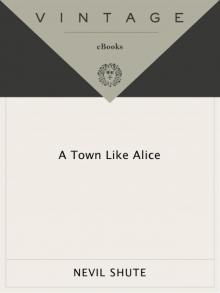 A Town Like Alice
A Town Like Alice The Far Country
The Far Country Pied Piper
Pied Piper Round the Bend
Round the Bend An Old Captivity
An Old Captivity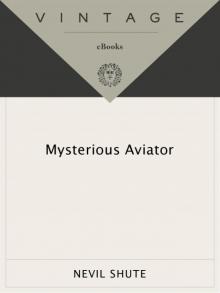 Mysterious Aviator
Mysterious Aviator The Breaking Wave
The Breaking Wave Marazan
Marazan Lonely Road
Lonely Road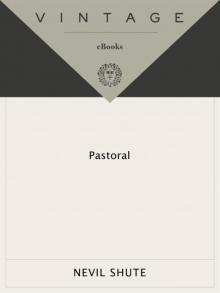 Pastoral
Pastoral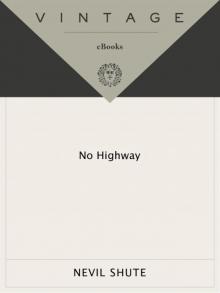 No Highway
No Highway Stephen Morris and Pilotage
Stephen Morris and Pilotage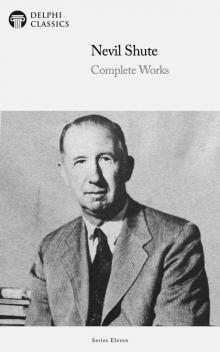 Complete Works of Nevil Shute
Complete Works of Nevil Shute Most Secret
Most Secret Beyond the Black Stump
Beyond the Black Stump The Rainbow and the Rose
The Rainbow and the Rose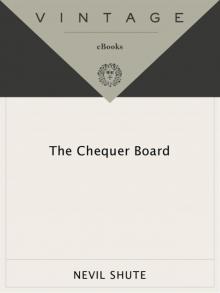 The Chequer Board
The Chequer Board Trustee From the Toolroom
Trustee From the Toolroom Ordeal
Ordeal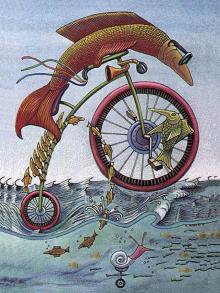 Stephen Morris
Stephen Morris